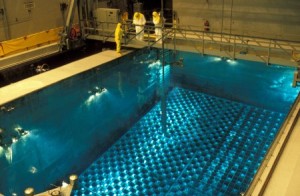 Since the development of the Yucca Mountain Nuclear Waste Repository was terminated in 2011, no long-term plan for storing spent nuclear fuel accumulating at nuclear power plants has been developed. As a result, utilities have been forced to store spent nuclear fuel “on site,” where storage space grows tight and is increasingly expensive to manage.
Since the development of the Yucca Mountain Nuclear Waste Repository was terminated in 2011, no long-term plan for storing spent nuclear fuel accumulating at nuclear power plants has been developed. As a result, utilities have been forced to store spent nuclear fuel “on site,” where storage space grows tight and is increasingly expensive to manage.
The federal government is required by law to provide (since 1998) offsite storage for spent nuclear fuel, but has yet to do so. Furthermore, until last month’s ruling by a federal appeals court, the Department of Energy (DOE) had been collecting a fee from nuclear utilities to fund a long-term storage program. However, no such program currently exists, a point many utilities have subsequently sued DOE over, and won. Payments and settlements to utilities to-date exceed $2.6 billion, and some estimate that number could exceed $20 billion if DOE doesn’t accept spent fuel by 2020.
Senator Lisa Murkowski (R-AK) and three others proposed a bill, “The Nuclear Waste Administration Act” (S. 1240), intended to address the spent nuclear fuel storage issue. The bill, currently being considered in committee, would create a new agency specifically organized to handle nuclear waste, and set up interim off-site storage locations that utilities could use in exchange for settling their lawsuits.
How significant is the nuclear waste disposal problem? Is Senate Bill 1240 a viable solution? Are there other solutions, such as reprocessing?
Relevant resources:
“Spent Nuclear Fuel: Accumulating Quantities at Commercial Reactors Present Storage and Other Challenges” — U.S. GAO Report
How significant is Harry Reid?
As with most Federal policies, the nuclear waste solution has been a ponzi scheme since the first press release was issued for “Atoms for Peace”. Some 60 years ago, nuclear… Read more »
Since 1972 I have argued that full cost accounting for nuclear fission had to include the realistic costs for decommissioning and waste disposal. I have also argued that the French… Read more »
Elliot, The U.S. government cannot be blamed for the failure of Yucca Mountain ?????? Surely you are joking! Maybe just trying to get attention? If not the US Government’s fault,… Read more »
I have been at all corners of the utility debate from a client perspective, but my personal views have developed over time (40 years). I specialize in the crossover between… Read more »
Elliot, I appreciate the discussion of your evolution over the years. I too have evolved with education and experience. The following is a little blog I wrote more than a… Read more »
Samuel, I certainly agree that we need a new approach to high level waste management. And of course it would and should be regulated by NRC. DOE has indeed poisoned the… Read more »
Elliot, Re fuel storage at CT Yankee. It is dry storage…no water no pool. See the following from Google. Note that the government is paying damages for their defaulted commitment… Read more »
There are plenty of issues to discuss here, and it seems that the discussion is going off on tangents. For example, I believe that Elliot Taubman meant to say that… Read more »
Geoffrey, Thank you for a brilliant posting! You are obviously well qualified and intelligent enough to discuss the issue rationally. I believe the Southern Company (Mississippi Power) will demonstrate the futility… Read more »
Geoff – nice to see you posting on this site. Most people I’ve spoken to about nuclear waste reprocessing raise two issues. First, it is significantly more expensive than a… Read more »
Thanks for the comments Doug, What other forms of greenhouse gas emissions are being targeted. Whatever, they do not get the attention that power generation gets. Should we not go… Read more »
From the wheat fields of Kansas to the Blue Ribbon Commission on America’s Nuclear Future, nuclear waste politics continue to dominate the uncertainty of the future of nuclear energy in… Read more »
Samuel, Thank you for a well written summary of the history and status of the high level waste issue. I have not yet seen a compelling argument for the creation… Read more »
Jack, Thank you for your comment. My argument for the creation of a new organization with the express goal of used nuclear fuel management again relies on the history. The… Read more »
Samuel, Thanks for the response. It is probably a matter of age, but I cannot support the creation of another government enterprise to deal with high level waste after the… Read more »
Wayne Moody, Vorsana, Inc. I began my nuclear career in basic (preliminary) engineering with Bechtel in San Francisco. This was in the early 1970’s. At that time, (under USA research) “fast Breeder Reactors”… Read more »